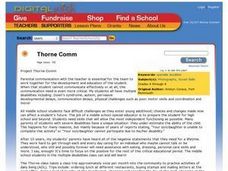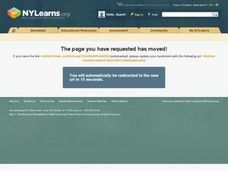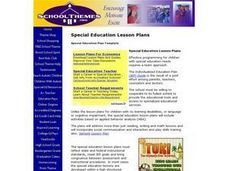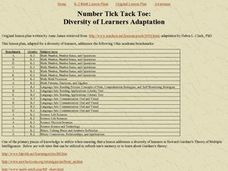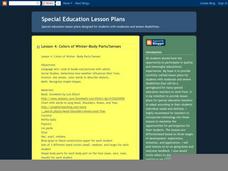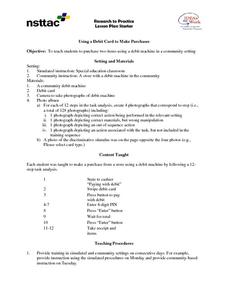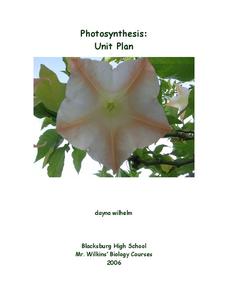ProCon
Gay Marriage
The first legal gay marriage in the United States occurred in Massachusetts in 2004. Since then, countless others have tied the knot. Scholars decide whether gay marriage should be legal by reading a history of the issue, analyzing the...
Workforce Solutions
Survivor Island
Decisions, decisions! Small groups decide on their dream career then enter a scenario that challenges them to make another big decision—if stranded on a deserted island, who would be saved or fed to the sharks. Because decisions are...
Curated OER
Project Thorne Comm
Middle schoolers participate in a class that is designed for those who have physical and mental disabilities. They take part in class activities and field trips planned around the development of skills for activities of daily living. The...
Curated OER
Discriminating Issues
Students examine how U.S. Law Defines Discrimination In this lesson. They research the issues surrounding a variety of types of discrimination, and then write editorials analyzing legal and social positions on discrimination in the...
Curated OER
Failure-Proof Writing: Assignments for the Student Who Can't/Won't Write
Young scholars with learning disabilities are introduced to the techniques of proper writing. After completing a warm up, they practice writing about what they saw to determine where they are at in the process. In groups, they complete...
Curated OER
How the Brain Learns
Students identify the basic function of the lobes in the brain. In this memory lesson students complete a lab activity on how fast they can react.
Curated OER
Science Review Using Movie Maker
Students reinforce science concepts learned throughout the year using Movie Maker. Eighth grade students work with fourth grade students in which they create a movie project about a science topic after completing a graphic organizer.
Curated OER
Special Education Plan
Special needs students practice completing everyday tasks such as organizing a day plan, reading a clock and completing simple math problems. They define the proper learning techniques for their disorder and utilize props in learning...
Curated OER
Where's the Boss? -- A Scripted Play About the Iditarod
Pupils utilize a Reader's Theater script and accompanying lesson plan to learn about the Iditarod race that takes place in Alaska. During the process, they also learn about teamwork and working together.
Curated OER
Number Tick Tack Toe
Students participate in activities that apply Howard Gardner's theory of Multiple Intelligences in order to improve literacy skills. The lesson is ideal for diverse learners because of the application of the theory.
Curated OER
Private & Public
Some disabled students have a difficulty understanding what is and what is not publicly appropriate behavior. Help them build healthy social skills by defining public and private behaviors, labeling public and private places, and...
Curated OER
Colors of Winter-Body Parts/Senses
Fun is in the air as learners with special needs engage in sensory-filled activities. They discuss color, snow, cold, winter, and body parts while touching and smelling various objects. They discuss the parts of the body with relation to...
Curated OER
Using a Debit Card to Make Purchases
After you make a photo album of image depicting the process of using a debit card, kids in your class can start practicing. They learn how to use a debit card in various shopping and community settings to gain independent shopping...
Curated OER
Photosynthesis
We all know photosynthesis happens, but why should we care? Here is a unit that covers everything young scholars need to know about photosynthesis. Hands-on activities, assessments, and lectures guide pupils though the physiology of a...
Social Skills Central
Ready, Set, Respond!
When faced with a difficult situation, do you respond selfishly, face it head on, or ignore the problem? This game encourages learners to evaluate the wide range of reactions we can have to problematic situations, and how our responses...
Curated OER
SPORTS Lesson Plan: Trading Cards
After visiting websites about the Special Olympics, your class creates trading cards about people with disabilities and the adaptations that have been made for them in sports.
Curated OER
Parking Pass
Students look at the rights and laws created to assist individuals with physical disabilities. In this instructional activity on fair treatment for all, students discuss symbols that related to people with disabilities. They create a...
Curated OER
Number Line Locomotion
Here is a great lesson that incorporates movement into academic learning. Students improve addition subtraction skills by using number lines and locomotor movement.
Curated OER
Measure Twice, Cut Once
Elementary schoolers learn about metric units and how they are used by engineers. They learn how engineers use the units to measure mass, distance, and volume. Then, they estimate measurements of units, and compare them to actual...
Perkins School for the Blind
Friction
Friction is a force that can be felt, which means that learners with visual impairments can experiment to feel and understand the concept of friction. They slide a rock along a smooth table, and then they slide a rock across sandpaper,...
Reading Resource
Tic-Tac-Toe
Who can match three words first? Using a tic-tac-toe template, kids fill in nine words from their vocabulary word wall, and listen for the teacher to call out words that match their game boards. The first to get three in a row wins!
Curated OER
Physical Differences
Students role play what it would be like to have a physical disability. In this lesson on acceptance, students listen to the book A Rainbow of Friends by P.K. Hallinan. As a class, the students discuss similarities and differences in...
Curated OER
Reading Without Seeing: Louis Braille and the Braille Alphabet
Students study Louis Braille and the history of the Braille alphabet. They participate in an activity using the sense of touch to determine how the Braille alphabet works.
Curated OER
Translating Science Into Public Policy
Students role-play participants at a panel on climate change. They represent either scientists or policymakers. "Scientists" use the information they've learned in other classes and assignments to present information to "policymakers,"...




